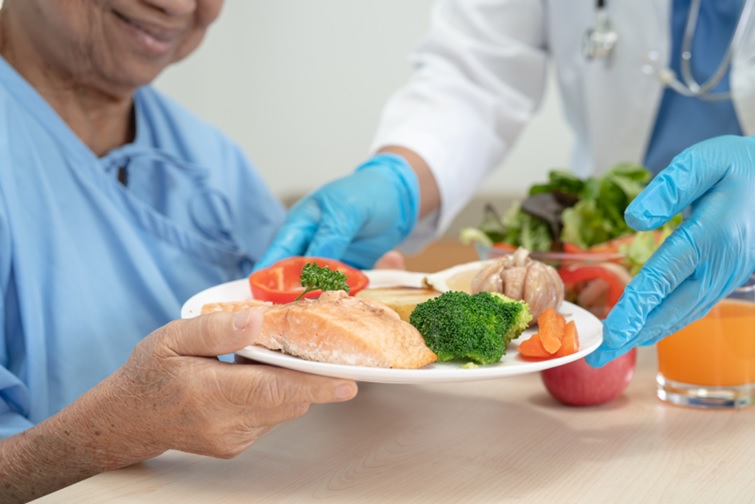A dedication to keeping yourself and your family fit and healthy can sometimes transform into a calling to become a healthcare professional. That includes considering the best way to specialize in the highly important topic of nutrition.
How do you become a nurse practitioner who dispenses nutritional advice, and what sort of tasks would you be carrying out daily?
Do you feel purposeful nutrition is vital?
First, let’s explore why someone might decide to look at the steps to becoming a qualified nutritionist or embarking on a Family Nurse Practitioner program to give dietary advice to people of all ages.
There is a growing awareness that there is a massive amount of truth in the expression “You are what you eat”. As medical science advances, so does our understanding of how our diet impacts our health.
Good nutrition is not just about keeping our body at its best; it can support the effective working of every essential biological function. It is also vital to our cellular repair, growth, and healing.
Ensuring that you consume a good balance of the right vitamins, minerals, and dietary microbiome can therefore make you feel better and give you energy and vitality. It can also help you to prevent disease, and even minimize the risks of any genetic illnesses that may run in your family.
If you do get sick or injured, being purposeful in your nutrition can help to support the healing and recovery process.
Let’s use vitamin D as an example of why nutrition is such a crucial aspect of human health and development.
Did you know that over a third of the adult population in the U.S. are currently believed to be deficient in this ‘sunshine vitamin’, despite the fact our bodies produce it naturally? This is partly due to less time soaking up natural light, and also to dietary habits. The most Vitamin-D-rich foods are eggs, fish, and red meat, and anyone on a low-fat or vegan diet is particularly at risk of not getting enough.
As we age, our ability to absorb and use vitamin D declines, and we may spend even less time outdoors. That leaves the elderly at particular risk of a deficiency and 50-60% of nursing home residents are believed to have a shortfall.
The effects of low levels of vitamin D are extensive, including osteoporosis (fragile bones); aching and weak muscles and joints, and low immunity to infection.
Does this sort of thing inspire you to make a difference, and encourage better dietary habits and sensible food supplementation? Then you may want to consider how to become a nurse specializing in giving out vital nutritional advice and support.
You can start your journey to a meaningful career as a FNP. You can earn your degree in a flexible, virtual environment with quality professors and peers from around the country.
What is a family nurse practitioner?
Becoming an FNP is one of the best ways you can influence nutritional understanding and better health, in a wide range of ages, including helping children to adopt healthier food habits from birth onwards.
A family nurse practitioner works within communities and local healthcare settings, to help patients of all ages to better protect and maintain their overall health and wellbeing.
That can involve, for example, visiting new mothers to help them to support their health, and give their babies the best possible start. Or an FNP could be assigned to work with a Family Practice Doctor, to support and supplement the work they do with patients of all ages in their local community.
It’s a nursing role that is highly likely to require excellent leadership and organizational abilities, as there will be numerous priorities each day. It will also involve Continuous Professional Development and research, to stay ahead of healthcare developments, such as innovation in the field of nutrition.
It is also an excellent starting point for transitioning into the role of Nutrition Nurse specialist, someone who works with patients to manage various medical conditions through considered diets and food supplements.
How to become an FNP
For many people, the quickest and most rewarding way to gain the correct qualifications for this type of job role is by taking advantage of the excellent remote learning opportunities that now exist for healthcare professionals.
The Carson-Newman Online FNP programs are a superb example of the high standard of nursing education you can achieve while continuing to manage any existing family and work commitments. That includes offering existing nurses an achievable and attractive way to do an MSN-FNP (Master of Science in Nursing – Family Nurse Practitioner) program online.
Carson-Newman University’s online family nurse practitioner programs deliver the technical abilities and in-depth healthcare knowledge required to gain a post of this kind, including when your ultimate aim is to be a nutritional specialist.
However, the programs focus on personal – as well as professional – development. That includes the soft skills needed to be a successful FNP, such as communication, emotional intelligence, and confidence in your ability to make a difference in your patients’ health and everyday lives.
Why nutrition matters
This article has already illustrated how important nutritional support is for the health of people in the U.S. This is increasing demand for community-based nurses who can guide patients of all ages towards making better informed dietary decisions.
Finally, here is another important statistic, that may inspire you to start or further your nursing career and focus on nutrition and lifestyle improvement. We all know the value of exercise in maintaining good health, and also in alleviating medical conditions such as using back pain exercises you can do at home.
However, making better lifestyle choices can also protect people from some serious illnesses. Estimates suggest that over 25% of illnesses are preventable. As a family nurse practitioner with a specialty in nutrition, you can make an impact in the lives of countless people and help prevent lifestyle-related diseases.

